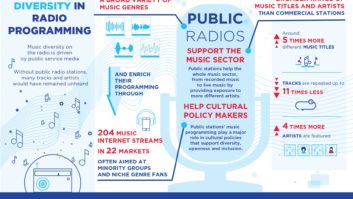The unprecedented consolidation of the commercial radio industry that followed the Telecommunications Act of 1996 has led to a loss of localism, less competition, fewer viewpoints and less diversity in radio programming in media markets across the country, according to “Radio Deregulation: Has It Served Citizens and Musicians?” a study released by the Future of Music Coalition.
“Our report clearly demonstrates that the radical deregulation of the radio industry has not benefited the public or musicians,” said Jenny Toomey, executive director of the Future of Music Coalition. “Instead, it has led to less competition, fewer viewpoints, and less diversity in programming.”
The group intends to file its report with the FCC as part of the public record for the media ownership proceeding.
Key findings include: Ten parent companies dominate the radio spectrum, radio listenership and radio revenues and Oligopolies control almost every geographic market.
Sen. Russ Feingold, D-Wis., said the study “reflects the concerns I have been hearing from independent radio stations, concert promoters, artists and consumers. The Telecommunications Act of 1996 opened the floodgates for concentration and resulted in anti-competitive practices such as a new form of payola.”
Feingold introduced a so-called anti-payola bill into the 107th Congress “to ensure that concentration of ownership and cross-ownership of promotion services or venues are not used to hurt musicians, concert promoters, or other radio stations.”
Reacting to an advance copy of the study earlier, NAB called the methodology “flawed” and said it contained little of news value.
FMC Assails Concentration
FMC Assails Concentration












